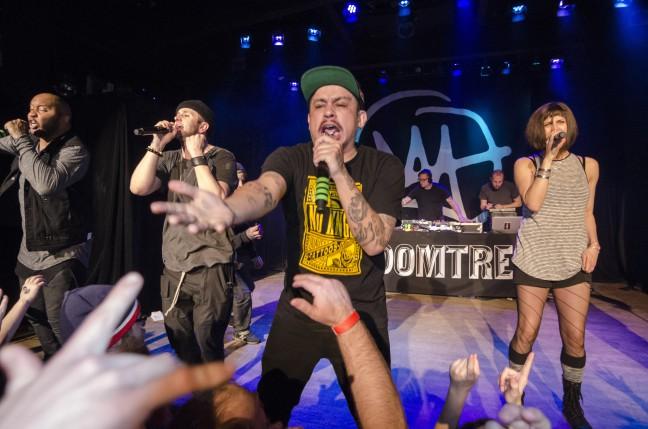Doomtree flashed their pride by raising their “wings” — the defining logo of the group — as they stepped onstage at 10:51 p.m. Saturday. It was just late enough to awaken the Majestic with splitting beats and a bottomless energy.
The set-up kept the producers slamming synth boards behind a broad table labeled DOOMTREE, while the five rappers kept up a constant range of movement center stage. It was immediately clear from their interactions that they’ve been at this for a while.
The Minneapolis hip-hop collective, composed of five rap artists and two producers, screamed, danced, spit and sang loudly, courting their fandom with a new album, All Hands. Founded by P.O.S. and MK Larada in 2001, Doomtree has gradually embraced the current group of seven: rappers P.O.S., Dessa, Cecil Otter, Sims, Mike Mictlan, and producers Paper Tiger and Lazerbeak.
The evening started out with openers Greg Grease, very much a rapper’s rapper, and Open Mike Eagle, a witty and candid performer with a shy comportment yet an ease with words. The crowd easily caught on, eager to participate. But by the time Doomtree came on stage, we were practically up in arms, hungry to hear familiar beats.
With little introduction, Doomtree proceeded to tear through their 2011 album No Kings, spouting songs like “No Way” and “Bolt Cutter” with the insatiable energy and filthy-good anger that’s required for a two-hour hip-hop performance. Quickly moving into their new album with the self-lauding “My Own Nation,” the artists shouted together to form a chorus of quick platitudes that drove the audience up the wall. It’s was easy as saying:
“What we want, we take it.”
In their song “Bangarang,” Doomtree shouted out pride in their success to the crowd: 10 years of Doomtree Blowouts (which they recently called to an end; the last one took place in December 2014) and three official albums. They proclaimed their comparative musical success with confidence:
“All these rappers sound the same. Beats, sound the same. Raps, sound the same.”
Although Doomtree is not a far departure from the core characteristics of rap, they can take pride in being a seldom-seen, unique form of hip-hip. Loud, floor-shaking beats were ever-present, verse lyrics were relatively inaudible if not completely obscured by audience excitement and most importantly, they portrayed their performance as a choreographed work of art. The way they interacted was an object of fascination. They sometimes butted heads; though all the while, shared an obvious sense of purpose.
Despite solidarity on stage, the separate artists had definitive moments to display their own personal work: P.O.S. brought out his song “Drumroll,” easily identifiable by the motif “We’re all thirsty.” P.O.S. is possibly the most talented rapper in the group, barely getting one word out before moving onto the next; yet, remaining decipherable and connected to the core weight of the beat.
In the midst of loud fun and raucousness, the group took a pause as Mike Mictlan led the audience in the all-too-familiar words of protest:
“Hands up, don’t shoot.”
The audience raised their hands in an unexpected moment of gravitas.
With little time to pause, Doomtree fell straight back into their act, returning to their deeper tracks. The audience’s vibes shifted with songs like “Little Mercy” — an easy example of why Doomtree is more than just plain rap, touching on something haunting and emotional with Dessa’s echoing hums filling the empty space.
The height of emotion came with Dessa’s “Call Off Your Ghost,” during which she hopped off the stage and allowed the audience to surround her in a melancholy haze.
But with the slow and heartbreaking came a quick jump to the ordinary with P.O.S.’s “Get Down,” which turned the Majestic into a five-minute rave. The openers and even the audience got on stage, inciting a playful “you motherfuckers” from P.O.S., as the night reached its high point.
The Doomtree Blowout tradition may have come to an end, but the group’s artistic dialogues, experimental atmosphere and infinite energy have yet to burn out.


